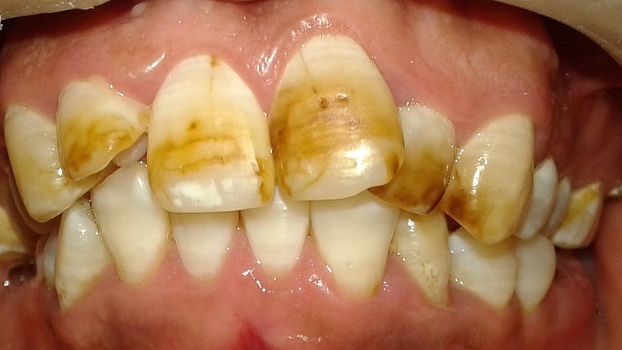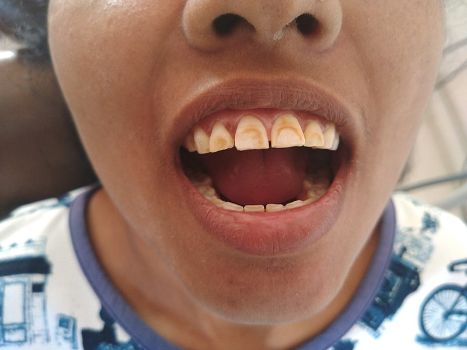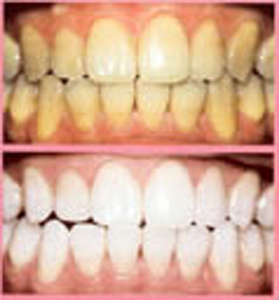The quality of well water varies greatly from one well to another. Hence, getting your water tested and discussing the findings with a dentist is important to know how it may affect your oral health.

How Hard Well Water Affects Your Teeth?
Most private wells in the US have hard water. Hard water can damage appliances, cause itches & rashes, hair loss and affect hair color. It is rich in minerals such as calcium and magnesium.
Drinking hard water or using hard water to brush your teeth means consuming more minerals, increasing your saliva’s mineral content. The mineral-rich saliva increases the remineralization of teeth. When you consume acidic or sugar-rich foods and beverages, they cause demineralization (some minerals of enamel are resolved). The mineral-rich saliva instantly remineralizes our teeth. It ultimately prevents tooth decay.
However, mineral-rich saliva quickly forms tartar on teeth and gums. It can cause gum problems if not removed periodically at a dentist.
People drinking or brushing their teeth with hard water are more prone to gum diseases, and those using low-mineral water are prone to tooth decay problems.
It is critical to note that the mineral content in your water is also important when deciding whether hard well water will affect your teeth. If your water is extremely hard (above 180 mg/L), you must not use it to brush water as it can damage the teeth enamel. The most reliable solution to hard water is to install a whole-house water softener or install a faucet filter to remove hardness.
Is Soft Water Good for Oral Health?
Installing a water softener is long-term beneficial for your home and health. However, research has not proved that soft water is beneficial for oral health.
Hard water can form deposits on appliances, your skin, and hair and damage plumbing. So, removing hard water from your life is a good idea. You can easily make up for lost calcium and magnesium from health.
Although calcium is required for teeth health, excessive calcium can be problematic for your teeth.
Does Well Water Stain Teeth Yellow?
No solid evidence suggests that well water can turn your teeth yellow. Well water may be contaminated with aluminum, arsenic, antimony, bismuth, cadmium, copper, lead, iron, manganese, and other elements.
These elements may affect your oral health in one way or another, including teeth color. For example, iron-rich products may make your teeth black, and silver nitrate, sulfide, or manganese can make your teeth grey, yellow, or black. Similarly, copper or nickel can make teeth green.
You must get your well water tested and consult a dentist if you fear your teeth are getting stained due to well water.

Contaminants in Well Water and Their Impact on Teeth
- Iron, silver, and manganese: black stains
- Nickel & copper: blue-green stains
- Lead and mercury: gray stains
- Iodine: brown stains
- Silver nitrate: black stains
- Fluoride: yellow to brown stains
- Stannous fluoride: brown stains
Fluoride, Well Water, and Oral Health
Fluoride is important for oral health. It prevents tooth decay, stops bacterial growth, and helps repair early stages of tooth decay. This is why you see fluoride as an essential element in most oral care products.
Since the quality of well water varies from one well to another, you cannot be certain that your well has at least 0.7 mg/L fluoride. Moreover, it can also contain fluoride above 4.0 mg/L, the maximum limit CDC sets.
The only way to check fluoride level is to test your well water. If it is below 0.7 mg/L, your dentist may recommend fluoride supplements for oral health. If it is above 4.0 mg/L, you must install a water filter to remove excessive fluoride. A reverse osmosis filter is best for removing fluoride from well water and makes it fit for drinking, cooking, and brushing teeth.
Higher fluoride levels in well water can lead to fluorosis. It can damage your teeth and cause discoloration. This is why city water is tested and treated for fluoride before it is supplied to your homes.
Treatment of Stains due to Well Water
The most important thing to do before adopting a treatment plan is to make sure that the culprit behind stains is well water. If the stains started appearing after you moved to a home with a private well or changed your home, water is probably causing the trouble. However, visiting a dentist to rule out any other possibility is better.
Your dentist may recommend scaling, polishing, whitening toothpaste, homemade whitening products, or changes in your diet and lifestyle. You may be required to give up smoking, foods, and beverages causing the stains.
Which Type of Water is best for Brushing Teeth?
- Tap (City) Water: Tap water is great for brushing teeth as it contains all the required minerals in the right amount. Moreover, it is fluoridated to ensure proper oral health.
- Bottled Water: Bottled water is fine for brushing teeth but mostly misses fluoride. You can easily get all the required minerals from other foods.
- Sparkling Water: Sparkling water is carbonated water with more acidic content than plain water. However, the acidic content is not too much and will not harm your teeth.
- Distilled Water: Distilled water is pure H20. It doesn’t contain any minerals or contaminants. Hence, it is neither harmful nor beneficial for your teeth.
- Salt Water: Salt water is great for occasional gargling and brushing. It helps fight off bad bacteria in your mouth. Some dentists recommend gargling with salt water for mouth sores, sore throat, or after a dental surgery.
- Hot or Cold Water: The water temperature doesn’t affect its suitability for brushing teeth. However, hot or cold water may hurt your teeth and result in discomfort.

What Can Cause Tooth Discoloration Other Than Water?
- Poor dental hygiene
- Diseases
- Medications
- Dental materials
- Environment
- Trauma
- Smoking
- Aging
- Genetics
Final Words: Is Well Water Safe to Brush Your Teeth?
Yes. Well water is mostly safe for brushing your teeth. However, you must get it tested at least annually to clear all doubts. The elements to look out for are calcium and fluoride. Both of these are required for oral health but in moderate quantity. Too much or too less concentration is bad for your teeth.
